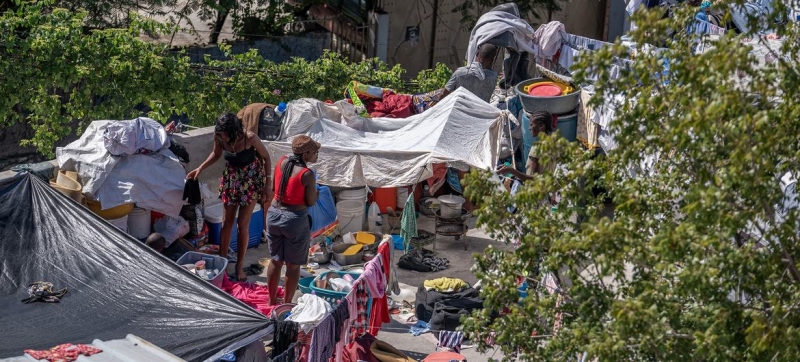- CA Yunus pays homage to Liberation War martyrs on Victory Day |
- Bangladesh capital market extends losing streak for second day |
- Bangladesh celebrates Victory Day Tuesday |
- 'Different govts presented history based on their own ideologies': JU VC |
Haiti’s Displaced Children Face Growing Threat of Sexual Violence

Displaced by relentless gang violence, Haitians seek refuge in the streets of Port-au-Prince. Children, in particular, face grave risks including sexual abuse and exploitation. Photo: Antoine Lemonnier
Armed conflict and lawlessness in Haiti have deepened an already devastating humanitarian crisis, exposing displaced children to horrific levels of sexual violence, exploitation, and trauma, the United Nations Office for the Coordination of Humanitarian Affairs (OCHA) warned on Wednesday.
Since the 2021 assassination of President Jovenel Moïse, gang violence has surged across the capital, Port-au-Prince, spreading into provinces and tearing through neighbourhoods, displacing over one million people. Children, who account for more than half of the displaced population, are bearing the brunt of this spiralling crisis.
According to the International Organization for Migration (IOM), one in every eight Haitian children has been uprooted in recent years. Forced from their homes and thrust into overcrowded shelters or makeshift camps, these children now face heightened risks of malnutrition, abuse, and sexual violence.
The figures are alarming. The UN Children’s Fund (UNICEF) has reported a staggering 1,000 per cent rise in sexual violence against children between 2023 and 2024—a shocking indicator of the deteriorating conditions on the ground.
The violence recently took an unspeakable turn. On 3 May, a six-year-old girl was brutally raped and died from her injuries at a temporary displacement site in Port-au-Prince. The attack sent shockwaves across the humanitarian community and served as a horrifying reminder of the dangers children now face in these vulnerable settings.
“This intolerable act shakes our conscience,” said Ulrika Richardson, the UN Humanitarian Coordinator in Haiti. “No child should ever endure such violence. We hope that justice will be served.”
Beyond sexual abuse, children are also increasingly at risk of gang recruitment. OCHA estimates that children make up nearly half of all gang members in the country, highlighting the extent to which Haiti’s social fabric is unraveling.
Despite enormous logistical challenges and rising insecurity, UN humanitarian partners are intensifying efforts to protect survivors and prevent further atrocities. In recent months, over 6,000 people—the majority women and children—have received psychosocial care, while 745 dignity kits have been distributed. Mobile care clinics have reached another 600 people, offering critical health services to those with nowhere else to turn.
Legal assistance, medical aid, and socio-economic reintegration programmes are also being deployed, though these lifelines are threatened by an overwhelming funding shortfall. So far, the UN has received just five per cent of the $11 million urgently needed to support victims of gender-based violence in Haiti.
“The suffering of Haiti’s children is a call to our collective humanity,” Ms. Richardson said. “We cannot look away. Acting together, in a coordinated and determined manner, is more necessary than ever to protect civilians and secure displacement sites.”
Meanwhile, another distressing development is unfolding at Haiti’s border. UN agencies are voicing deep concern over the increasing number of pregnant and breastfeeding women being deported from the Dominican Republic, often in violation of international human rights standards.
In the past month alone, approximately 30 women, either pregnant or nursing infants, have been treated at humanitarian centres along the Haitian side of the border. These cases are part of a larger wave of forced returns: April saw over 20,000 deportations, the highest monthly total ever recorded.
“These expulsions raise serious humanitarian and human rights concerns, particularly when they involve pregnant women or mothers with very young children,” Ms. Richardson noted.
The UN is calling for regional solidarity and humane migration policies that respect dignity and uphold international obligations. As Haiti’s crisis deepens, the international community is being urged to not only act—but to act swiftly, with compassion, resolve, and justice for those most at risk.

